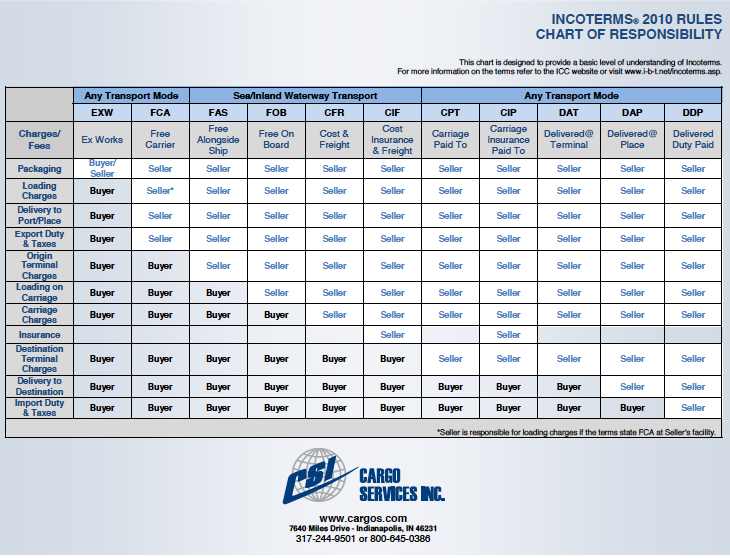by John Rowe
Cargo Services managing director
Many importers and exporters don’t have a clear understanding of Incoterms and how they apply to international business transactions.
Incoterms were developed by the International Chamber of Commerce to help provide standard business terms for international trade between countries. Incoterms help buyers and sellers understand the risk and cost associated with shipping goods overseas. Also the transfer of responsibility and liability between the seller and buyer. Incoterms help spell out the transfer of liability at a point in the shipping process when goods are passed from seller to buyer.
It’s important to understand in the United States Incoterms are guidelines for international business transactions; they are not legally binding on their own. Sellers and buyers should use Incoterms to help set the transfer of responsibility and liability between the parties in their purchase orders or sales agreements.
There are 11 Incoterms from sellers door to buyers door progressing in degrees of responsibility between seller and buyer. It’s important to understand the benefits of which Incoterm best fits your company’s requirements. For example, most exporters want the control of the transportation to the buyers destination port of ocean shipments. In this case, the exporter would chose CIF or CIP to the destination port. The benefits of controlling export transportation are the following:
- Provides a competitive advantage in servicing your overseas clients
- Ensures compliance with United States export customs regulations
- Ease of doing business with one or two quality freight forwarders that the exporter trusts. (Especially when dealing with multiple overseas clients.)
- Provides costs of delivering the exporter’s products to their overseas customers’ ports and helps them understand all costs involved
- Makes sure products are insured properly during transit.
For importers, FOB terms are best for controlling the transportation from the suppliers’ port. The same benefits apply for importers controlling the transportation as exporters. Specifically making sure the importer is in compliance with United States Customs for filing the Importer Security Filing (ISF), which is very important. Controlling the transportation ensure importers know the costs of importing the goods from the shipper. Working with a forwarder also makes it easier to get tracking information on import shipments.
It’s a good idea for companies doing business overseas to have employees who are knowledgeable about Incoterms. There are plenty of resources available online to help companies understand Incoterms. Our team is also available to help answer questions.
(Information for this article was sourced from: American Shipper articles by Tom Cook – Managing Director of Blue Tiger International and Corina Meono – Director of Operations at Dedola Global Logistics.)

